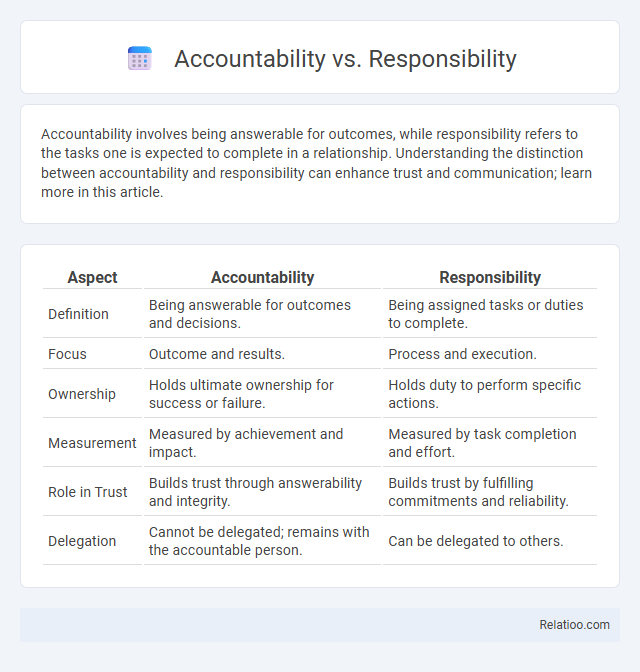Accountability involves being answerable for outcomes, while responsibility refers to the tasks one is expected to complete in a relationship. Understanding the distinction between accountability and responsibility can enhance trust and communication; learn more in this article.
Table of Comparison
| Aspect | Accountability | Responsibility |
|---|---|---|
| Definition | Being answerable for outcomes and decisions. | Being assigned tasks or duties to complete. |
| Focus | Outcome and results. | Process and execution. |
| Ownership | Holds ultimate ownership for success or failure. | Holds duty to perform specific actions. |
| Measurement | Measured by achievement and impact. | Measured by task completion and effort. |
| Role in Trust | Builds trust through answerability and integrity. | Builds trust by fulfilling commitments and reliability. |
| Delegation | Cannot be delegated; remains with the accountable person. | Can be delegated to others. |
Understanding Accountability and Responsibility
Understanding accountability and responsibility involves recognizing that responsibility refers to the specific tasks or duties assigned to you, while accountability is the obligation to answer for the outcome of those tasks. Your responsibility is to complete the work, but accountability means being held to the results and consequences of your actions. Clear differentiation between these concepts enhances organizational efficiency and personal performance.
Key Differences Between Accountability and Responsibility
Accountability refers to being answerable for outcomes and ensuring that tasks are completed as agreed, while responsibility involves the obligation to perform specific duties or tasks assigned to you. Accountability often implies a higher level of ownership where you must report on results, whereas responsibility focuses on the execution of tasks without the necessity to explain outcomes. Understanding these key differences helps clarify roles and expectations, ensuring Your team operates effectively with clear boundaries between performing duties and being held liable for their completion.
The Importance of Accountability in the Workplace
Accountability in the workplace ensures employees are held answerable for their actions, promoting transparency and trust within teams. Unlike responsibility, which refers to assigned tasks, accountability involves owning the outcomes and consequences, fostering a culture of reliability and improved performance metrics. Emphasizing accountability reduces errors, boosts employee engagement, and aligns individual goals with organizational objectives, driving overall business success.
How Responsibility Shapes Organizational Culture
Responsibility shapes organizational culture by defining clear roles and expectations that drive employee behavior and decision-making. When individuals understand their responsibilities, it fosters a culture of ownership and proactive problem-solving, enhancing overall teamwork and productivity. Your organization's success depends on cultivating a culture where responsibility encourages accountability, ensuring goals are met efficiently.
Real-Life Examples: Accountability vs Responsibility
Accountability means being answerable for the outcomes of your actions, while responsibility refers to the duties assigned to you. For example, in a workplace project, your responsibility might be to complete a report, but accountability involves ensuring the report meets quality standards and deadlines. Clear understanding of both concepts can improve your performance and foster trust in real-life situations.
The Role of Leadership in Fostering Accountability
Leadership plays a critical role in fostering accountability by setting clear expectations, modeling responsible behavior, and creating a culture where individuals understand their roles and are held answerable for outcomes. Effective leaders define the distinction between responsibility, the specific tasks assigned, and accountability, the ownership of results, ensuring team members are empowered yet answerable. By promoting transparency, consistent feedback, and support, leaders enhance performance and cultivate trust within organizations.
Why Confusing Accountability with Responsibility Causes Problems
Confusing accountability with responsibility leads to unclear roles, causing tasks to be left incomplete and outcomes to suffer. Responsibility refers to the duty to perform a task, while accountability involves being answerable for the final results and consequences. Misunderstanding these distinctions disrupts workflow efficiency and weakens organizational trust, making it crucial to define each clearly for effective team dynamics.
Building a Team Culture of Both Accountability and Responsibility
Building a team culture that emphasizes both accountability and responsibility is essential for peak performance and trust. Accountability ensures each team member is answerable for their outcomes, while responsibility highlights ownership of tasks and commitments. Fostering clear communication, setting explicit expectations, and encouraging mutual support drives collaboration and collective success.
Measuring Success: Accountability and Responsibility Metrics
Measuring success in accountability involves tracking specific performance indicators such as task completion rates, goal achievement, and compliance with deadlines. Responsibility metrics focus on the clarity of role assignments, the extent of task ownership, and the proactive management of duties assigned to You or your team. Effective measurement combines these metrics to ensure transparent evaluation of both individual contributions and overall team performance.
Strategies for Balancing Accountability and Responsibility
Effective strategies for balancing accountability and responsibility include clearly defining roles and expectations, ensuring transparent communication, and implementing regular performance reviews. Establishing measurable goals and empowering individuals to take ownership promotes a culture where accountability complements responsibility. Integrating feedback mechanisms and fostering trust also enhances alignment between personal duties and organizational objectives.

Infographic: Accountability vs Responsibility
 relatioo.com
relatioo.com